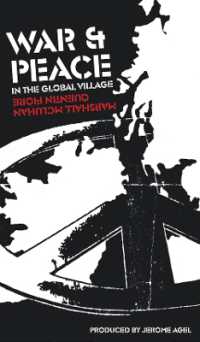- ホーム
- > 洋書
- > 英文書
- > Psychology
Full Description
Revisioning War Trauma in Cinema: Uncoming Communities uses philosophy and critical theory to examine films that participate in debates concerning trauma and representation. This book reflects upon films that invent—rather than represent—the moment history breaks down. Jessica Datema and Manya Steinkoler propose a twenty-first-century way forward across problems of trauma, inheritance, and representation into exceptional communities of artistic invention.
Contents
Acknowledgments
Introduction: Cinema of the Unbecoming
Chapter 1: Writing War Reporting Flesh Anonyma: A Woman in Berln
Chapter 2: Belonging is Uncanny: Wakolda, or The German Doctor
Chapter 3: Phoenix: The After-Death
Chapter 4: Austrißized: Woman in Gold
Chapter 5: Music as the Last Word: The Lives of Others
Chapter 6: Hannah Arendt: Revisioning Pariahdom in Dark Times
Chapter 7: Gasping for Death: László Nemes' Son of Saul
Chapter 8: Coppola's Beguiled: A History Detox
Conclusion
Bibliography
Index








